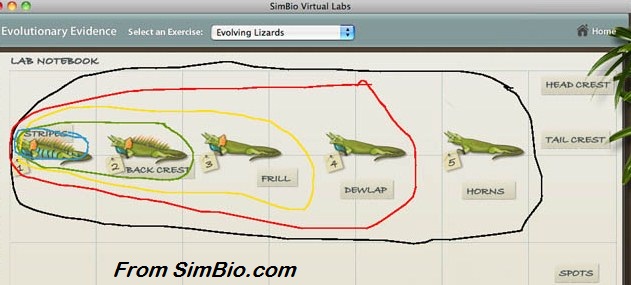You hear about evolution
frequently in the media today. Recent court cases about teaching
of evolution and intelligent design keep the topic in the
spotlight. Through your coursework and discussions, you are
beginning to understand the nature of science and how scientific evidence forms the basis for the theory of evolution. In this assignment you will focus on a key piece of evidence for evolutionary theory; specifically, traits of organisms and what they tell us about species' relatedness.
 For two class sessions you will study how nested sets of character traits are used to determine locations of species on evolutionary trees. Using traits of lizard species, you will test hypotheses about life on earth and change in species over time. Initially you will learn how to recognize patterns among different traits and how those can be used to form an evolutionary tree. You will use nested traits as a means of evaluating hypotheses about independent creation and descent with modification from a common ancestor. You will then make predictions based on pattens of nested traits and test your predictions using the order in which traits appear in the fossil record. Lastly, you will apply the methods learned about comparing nested traits to evaluate claims about change in organisms over time. Throughout these activities you will continue to use and build your skills of conducting scientific inquiry. For two class sessions you will study how nested sets of character traits are used to determine locations of species on evolutionary trees. Using traits of lizard species, you will test hypotheses about life on earth and change in species over time. Initially you will learn how to recognize patterns among different traits and how those can be used to form an evolutionary tree. You will use nested traits as a means of evaluating hypotheses about independent creation and descent with modification from a common ancestor. You will then make predictions based on pattens of nested traits and test your predictions using the order in which traits appear in the fossil record. Lastly, you will apply the methods learned about comparing nested traits to evaluate claims about change in organisms over time. Throughout these activities you will continue to use and build your skills of conducting scientific inquiry.
Work with a partner as you proceed through the different exercises of the simulation, discussing your ideas about the tasks assigned. When you get to the graded questions at the end of the simulation, complete those individually. |
 For two class sessions you will study how nested sets of character traits are used to determine locations of species on evolutionary trees. Using traits of lizard species, you will test hypotheses about life on earth and change in species over time. Initially you will learn how to recognize patterns among different traits and how those can be used to form an evolutionary tree. You will use nested traits as a means of evaluating hypotheses about independent creation and descent with modification from a common ancestor. You will then make predictions based on pattens of nested traits and test your predictions using the order in which traits appear in the fossil record. Lastly, you will apply the methods learned about comparing nested traits to evaluate claims about change in organisms over time. Throughout these activities you will continue to use and build your skills of conducting scientific inquiry.
For two class sessions you will study how nested sets of character traits are used to determine locations of species on evolutionary trees. Using traits of lizard species, you will test hypotheses about life on earth and change in species over time. Initially you will learn how to recognize patterns among different traits and how those can be used to form an evolutionary tree. You will use nested traits as a means of evaluating hypotheses about independent creation and descent with modification from a common ancestor. You will then make predictions based on pattens of nested traits and test your predictions using the order in which traits appear in the fossil record. Lastly, you will apply the methods learned about comparing nested traits to evaluate claims about change in organisms over time. Throughout these activities you will continue to use and build your skills of conducting scientific inquiry.